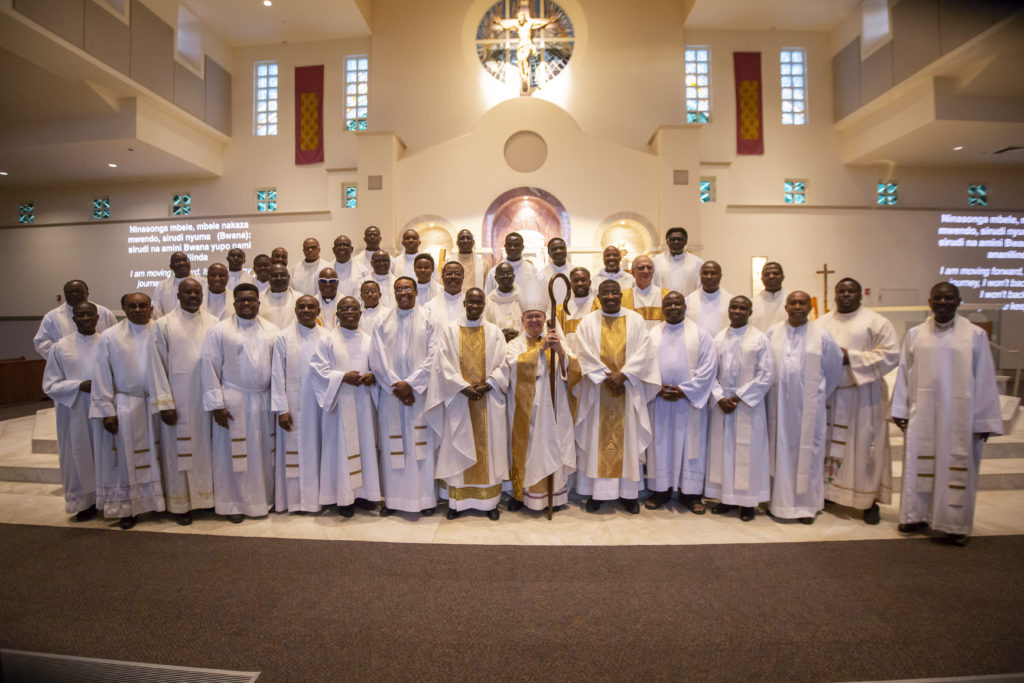
In its infancy, many of the parishes in the Phoenix Diocese were founded by priests from Ireland who left their native land to serve in the Southwest.
Today, an explosion of growth in the Catholic population of Africa has fostered a fresh bounty of foreign-born priests serving the Phoenix Diocese as well as dioceses sprinkled throughout California, Texas, New York, Maryland, Washington, D.C., and elsewhere. Heralding from places like Nigeria, Uganda, Ghana, South Sudan and Tanzania, 30 African priests — among them 13 from various orders — are spread out in parishes throughout the diocese.
“We are a missionary diocese,” said Sue Schindel of the vicar for priests office for the Diocese of Phoenix. “We don’t have enough priests in our diocese to sustain the needs of the people. The African nations are part of the missionary pool we draw from to ensure we have priests so parishioners can celebrate their freedom of religion and their Catholic faith in their neighborhood parish.”

Forty-three African priests, three deacons and 16 nuns serving in parishes throughout the U.S. gathered in Phoenix Aug. 1-4 for the 19th annual African Conference of Catholic Clergy and Religious in the United States.
Fr. James Aboyi, pastor of Holy Cross Parish in Mesa, is the national vice secretary for publicity and communication for ACCCRUS. He pointed to the mission statement of the organization which states that ACCCRUS provides “spiritual and social support for African priests and religious working in the U.S.” and works to “promote ongoing dialogue and solidarity between the Church in Africa and the Church in the United States.”
The four-day conference in Chandler focused on a theme of “A Global Church in a Globalized World: The implications for the Church in Africa,” and featured a keynote address by Fr. Aniedi Okure, OP.
Fr. Okure’s PowerPoint presentation set the theme in context by showing how the world has impacted Africa over time. A continent with abundant human and natural resources and vibrant faith communities still suffers from extreme poverty and poor infrastructure. This poverty in the midst of wealth can trace its roots to a “leadership deficit,” Fr. Okure said, characterized by corruption and corporations that support dictators, among numerous other causes.
At the same time, a “staggering number of African Catholics, religious, priests and homegrown vocations” exists. The percentage of Catholics who hail from Sub-Saharan Africa has jumped from less than 1 percent in 1910 to 16 percent in 2010.
Africans, Fr. Okure said, need to “celebrate and promote the deep communal and family values” native to their culture. They should also recall that “in the first five centuries, three popes were of African origin, of Roman North Africa”: Pope St. Victor I, who made Latin the official language of the liturgy; Pope St. Miltiades and Pope St. Gelasius I.
Fr. Fred Adamson, vicar general and moderator of the curia for the Phoenix Diocese, said the African clergy teach “great missionary zeal” in their willingness to leave their homeland and follow God’s call.
“They come as humble servants to a strange land and foreign culture to serve,” Fr. Adamson said. “They themselves were served by missionaries in their own country and now serve us in their witness and love of the Lord.”
Nancy Welton has been a parishioner at St. James the Greater Parish in Glendale for 19 years. She said the Apostles of Jesus, a religious community founded in Africa which has led the parish for more than a decade, has been a blessing.
“They have brought a tremendous love for the Gospel into our congregation,” Welton said. “These missionaries have profoundly impacted the many parishioners they serve in the diocese.”
Fr. Aboyi said the impact of African clergy on the Church in America can’t be quantified but is significant nonetheless.
“It’s not something we can measure but one of the impacts would be that we add to the diversity of the Church,” Fr. Aboyi said. “There are some elements of African culture and spirituality that we bring with us. Our approach to liturgy is a little bit different and we bring a sense of awe in the presence of God.”






















